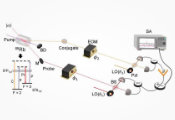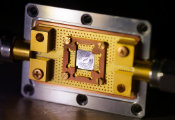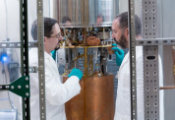380 Million Euros From EU for Photonic Chip Factory: Large Part Lands in Twente and Eindhoven
November 12, 2024 -- The Netherlands will have a European pilot plant for photonic chips. This future generation of chips will process information with light instead of electrons. A total of 380 million euros in public investment has been made available for this project by Europe and eleven participating countries, which participate in the Chips Joint Undertaking for this project. Twente will receive a significant share, a mega-boost for chip technology in Twente.
Of the 380 million euros, 133 million euros are expected to be invested in the Netherlands. Eindhoven and Enschede are the intended locations for the set-up of this pilot plant. Knowledge institutes TNO, Eindhoven University of Technology and the University of Twente are closely involved in the developments.
Prof. Guus Rijnders: 'Huge milestone'
Prof. Guus Rijnders, professor at the UT's MESA+ research institute and the captain of science for the Dutch top sector high-tech systems and materials, is closely involved in the investments. He speaks of a huge milestone. 'At the University of Twente, together with our spin-off companies, we have been putting a lot of energy into photonics since the 1990s. The fact that this recognition and investment is now coming is great. This development is in line with the new role of universities within ecosystems. By this I mean that scientists are enabled to innovate more quickly and to ensure that excellent research results in a market-ready product more quickly. A mission that is also described in the European Chips Act.'
20% market share in the semiconductor industry
The Chips Act is about a set of measures and investments that contribute to strategic autonomy and economic earning capacity in Europe. The pilot plant ('pilot lines') is part of this. One of the goals is to 'conquer' 20% market share in the semiconductor industry and to build first-of-kind facilities. In addition, investments are being made in setting up a Design Platform, a cluster of European Chip Competence Centers that should facilitate access to the pilot lines and the design platform. More info here .
Numerous innovations thanks to photonics
Photonic chips will make it possible in the future to build cheaper, faster and energy-efficient devices for specific purposes. These will enable earlier diagnostics of diseases, safe self-driving vehicles and more efficient food production, for example. The development of photonic chips is still in a relatively early phase, but will most likely play a key role in high-tech sectors where speed and energy efficiency are of great importance. Investments in photonic production facilities stimulate the building of future new markets in Europe.
Pilot plant: extremely low volumes
Guus Rijnders outlines the significance for the University of Twente and for the ChipTech Twente cluster. 'We already have a rich history in specialist spin-off companies in chip technology, such as LioniX International and Quix Quantum. They have been able to innovate thanks to existing infrastructure in the MESA+ NanoLab, but not all the infrastructure is yet in place for photonics. With the pilot plant, companies and scientists can take a crucial step towards a production environment. In the pilot plant, we are talking about extremely low volumes, where we can accurately map out processes and scale them up later.'
New Origin
According to Rijnders, the pilot plant is an important intermediate step towards New Origin. This new production facility for photonic chips, which originated from MESA+ at the University of Twente, has already received more than 20 million euros in support from PhotonDelta. This is a national ecosystem of organisations for photonic chip technology. New Origin will be the first independent photonic chip manufacturing facility to produce silicon nitride chips. Rijnders: 'Within New Origin, investments are being made in production equipment for the mid and higher volumes, which is about 25,000 silicon wafers of 200 millimetres. That's a big factor bigger than the pilot plant.'
Twan Korthorst, CEO of New Origin, also speaks of groundbreaking news. 'Investments from Europe in research and this new pilot line for photonic chips are important for New Origin. These investments ultimately contribute to more activity after the pilot phase and lead to volume production of photonic chips. New Origin works closely with parties in the Netherlands and Europe to enable a smooth transition from research, to development and ultimately production."
Minister Beljaarts: 'Photonics strategic technology'
Minister Dirk Beljaarts (Economic Affairs): 'This is good news. For the Dutch innovation climate as a whole and for the SMEs involved that are working this. It is not for nothing that photonics is one of the technologies that has been designated as strategic by the government. Our aim is to gain a strong European competitive position in this area. From knowledge, innovation, supply to final production. This is necessary for the jobs and income of the future, for solving social challenges and for our national security.'
What's next?
The Dutch public funding will be further elaborated by the Ministry of Economic Affairs in the coming period. If negotiations, contracts and financing are finalised, this project is expected to start in mid-2025. Rijnders expects the first equipment to be delivered in 2026.




































